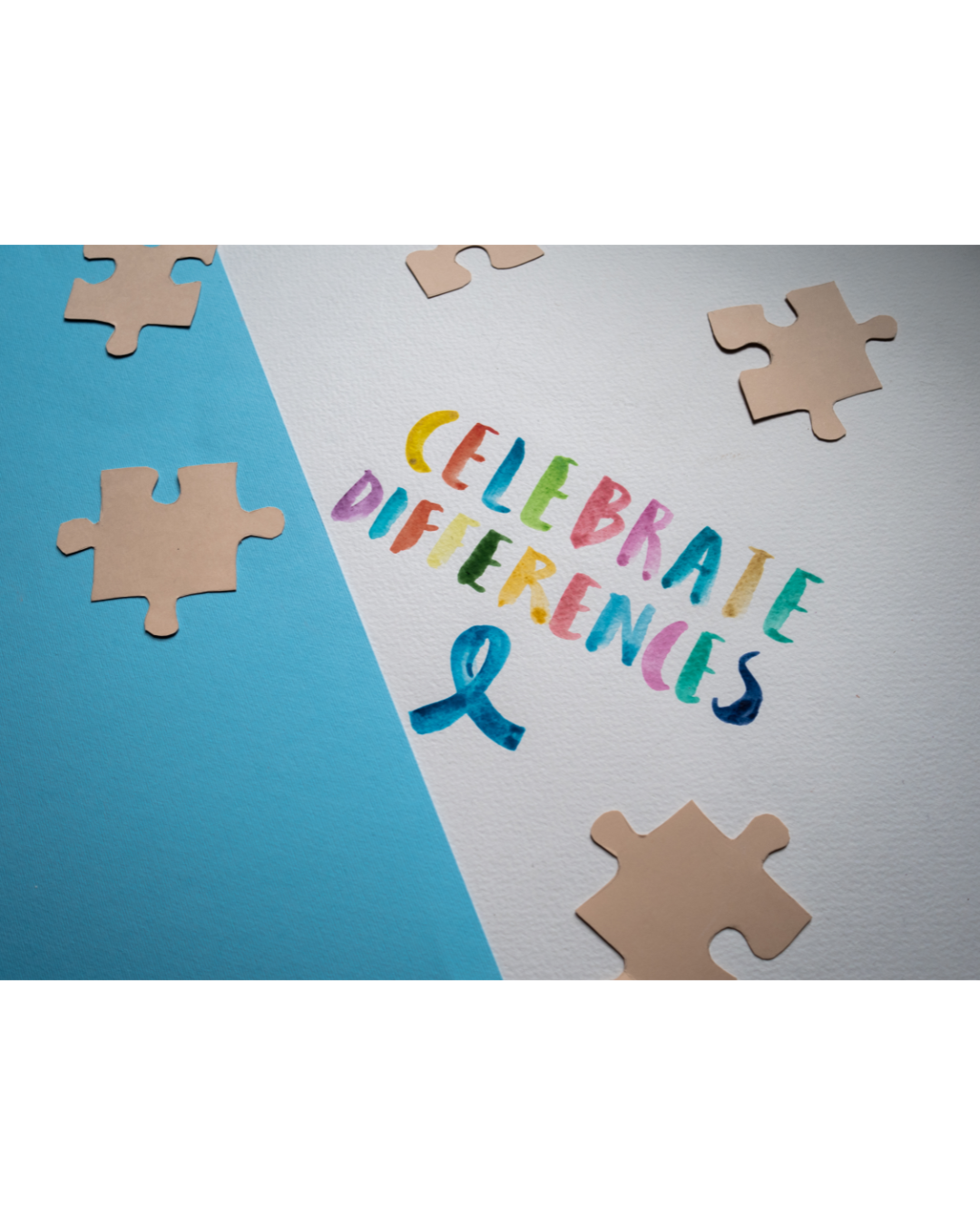
Some are born differnt but you can different too
1 in 31 children have been diagnosed with autism.This is a significant rise from previous estimates, like 1 in 36, In 2000. Will you choose to be different in order to help someone who was born different ?
Collapsible content
What is Autism ?
Autism is a developmental disorder that affects how a person interacts, communicates and behaves. Symptoms usually appear within the first three years of life but can be over looked and not realized until later in life as well.
What are systems of Autism?
some early childhood systems may include but are not limited to;
1. Repetitive behavior and limited interest
2. Heightened or reduced sensitivity to sensory input – which can make everyday experiences overwhelming.
3. Obsessive interest in things
4. Lack of responding to name
5. Lack of responding to eye contact
6. Not playing pretend games or imaginative play
7. Getting upset from changes
8. Different motor behaviors – delay in speech, flappy hands,
How can Autism affect every day life?
The brains of people with autism, produce 42% more information than a normal brain. People with autism brain’s have LOTS of more neurons, they get MORE of all senses, hearing, seeing, smelling, feeling & tasting. This is why people with Autism get so OVERLOADED. Types of overloads people with autism usually experience:
• FEELING overload
• SMELL overload
• SOUND overload
• Visual Overload & LIGHT overloads can occur.
How can Autism be Helped?
Autism cannot be CURED, but it CAN be HELPED. Speech therapy improves communication skills, Physical therapy helps build motor skills, behavior therapy encourages desired behavior, and cognitive behavioral therapy can help regulates emotion.
What is the birthrate for Autism
According to the Centers for Disease Control and Prevention (CDC), the estimated prevalence of autism spectrum disorder (ASD) among children in the United States is1 in 31 (3.2%).This is based on data from the 2022 Autism and Developmental Disabilities Monitoring (ADDM) Network survey however their prediction did entail a continuous rise in years to come which match with currently available data.
Is Autism known or referred to as anything else ?
Autism is also known as autism spectrum disorder (ASD). The Term “Spectrum” reflects the diverse range of symptoms and abilities among individuals with autism, or ASD.
is Autism a Illness?
Autism is NOT an illness, it is a condition, which causes your brain to work and process things differently.
How does Autism affect traveling?
Families with children with autism often are unable to travel to PREFERED destinations and vacations because of unknown sensory overloads that may be dormant in the environments and the discomfort that may bring the autistic individual.
It is important to normalize public environments and simulate what a "vacation" day may look like as early and routinly as possible or needed so comfortability and normalization allows more serene transitions for the autistic individual which in turn results in less stress for everyone as well.
Are there everyday people with autism ?
Many modern-day individuals diagnosed with autism have gone on to lead incredibly successful and inspiring lives, breaking barriers and redefining what’s possible. Temple Grandin – Scientist and Autism Advocate – has revolutionized the livestock industry and become a powerful voice for neurodiversity. In the entertainment world, Anthony Hopkins – Award-Winning Actor, who received a late-life autism diagnosis, has won multiple accolades for his craft. Dan Aykroyd – Comedian and Co-Creator of Ghostbusters has openly shared how his autism shaped his creativity. In sports, Elijah "EJ" McKown – Division I College Football Player and Clay Marzo – Professional Surfer, have thrived despite their diagnoses. Satoshi Tajiri – Creator of Pokémon has also credited autism with helping him focus deeply on his creative work. These individuals—and many others—prove that being on the spectrum doesn’t limit one’s potential for greatness. Instead, it can be a different lens through which brilliance shines.
How can I make a donation?
You can donate through Cash App, Venmo, or PayPal by clicking the donation link on our page. If you prefer to donate via check or wire transfer, please contact us directly and we’ll provide our financial institution’s information and guide you through the process.
Are donations tax-deductible?
Yes, all donations are tax-deductible to the fullest extent permitted by law. Once a donation is processed, you’ll receive a confirmation and receipt for your records.
Do you accept item donations?
Yes! We accept items of value for auction fundraisers, as well as year-round donations of non-perishable food, new toys, hygiene products, and other essential items to support families in need.
What types of items are best for donation?
For direct aid, we prefer non-perishable foods, sealed hygiene products (toothpaste, soap, feminine care, etc.), new toys, and basic household supplies. For auctions, we welcome gift cards, collectibles, artwork, or any item of value that can help raise funds.
Can I volunteer with your organization?
Absolutely. We welcome volunteers to help with events, fundraising, community outreach, and donation distribution. Visit our volunteer section or contact us to learn more about current opportunities.
How are donated funds used?
Funds go toward supporting individuals and families affected by autism or other challenges in our community. This includes emergency support, educational resources, community outreach, and awareness events.
Can I donate in someone else’s name?
Yes! Many people choose to donate in honor or memory of a loved one. Just include the dedication in your donation form or message us with the details.
Where can I find updates and impact stories?
You can follow us on social media and check our blog or news section for updates, event highlights, and stories showing how your support is making a real difference.
How do I get a receipt or confirmation for my donation?
After donating, a confirmation email and receipt will be sent to you. If you don’t receive one, feel free to contact us and we’ll be happy to resend it.
I have a business. Can we partner or sponsor an event
We’d love that! Please reach out to us via our contact form or email to discuss sponsorship opportunities, partnerships, and corporate giving programs.

Still Have More Questions?
Didnt see what you were looking for?
if so then scroll to the bottom of the page and send us a direct message!
At the heart of our organization lies a profound commitment to compassion, inclusion, and community empowerment.
We will stand by our mission to uplift and advocate for underserved individuals and families-particularly those affected by autism and communication differences-through tangible support, education, and year-round giving.
We believe in creating lasting change, not just through financial aid, but by fostering understanding, dignity, and opportunity. With every donation, every shared story, and every act of service, we move one step closer to a more empathetic and equitable world.
We are not just a nonprofit—we are a movement fueled by purpose, driven by heart, and built on the unwavering belief that every life has value and potential.
Highlights of Autism
-
Extraordinary Focus and Attention to Detail
Many autistic individuals possess a unique ability to focus deeply on specific interests or tasks. This intense concentration often leads to exceptional skills in areas like math, science, technology, art, or music—allowing them to master complex concepts or create brilliant, original work.
-
Innovative Thinking and Creative Problem Solving
Autistic people often see the world through a different lens, which enables them to approach problems in unconventional and highly effective ways. This out-of-the-box thinking has led to breakthroughs in fields like engineering, game design, and even entertainment.
-
Honesty, Integrity, and Loyalty
Many individuals on the spectrum are known for their sincerity, strong sense of justice, and unwavering honesty. These qualities make them deeply trustworthy, dependable, and often ideal contributors in personal relationships and professional environments.
Featured collection
-
Example product title
Regular price $19.99 USDRegular priceUnit price per -
Example product title
Regular price $19.99 USDRegular priceUnit price per -
Example product title
Regular price $19.99 USDRegular priceUnit price per -
Example product title
Regular price $19.99 USDRegular priceUnit price per

